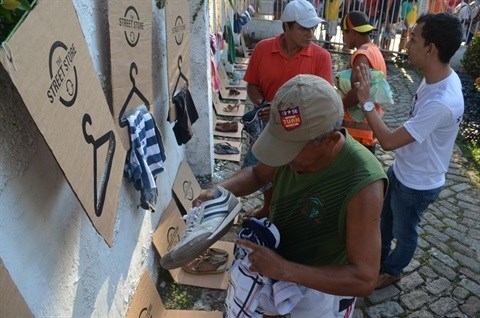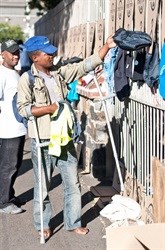





To date more than 263 people from around the globe have signed up to host the street store in their community, and the open source material has so far been translated into nine languages.

As the Street Store concept rolls out globally, picking up momentum, kudos has not gone unnoticed at the 2014 Cannes Lions Festival. The agency behind the concept - M&C Saatchi Abel - was awarded a prestigious Gold Lion in the design category, a bronze in the media category, with six other shortlists, including the Grand Prix for Good Award.
The idea was conceptualised and piloted in Cape Town by Kayli Levitan and Maximilian Pazak from M&C Saatchi Abel. The young copywriter and art director team brainstormed for months to find a way to bring the giver and the receiver together on the streets they share on behalf of The Haven Night Shelter.

The Street Store was created for The Haven Night Shelter, Cape Town's largest network of centres for the homeless. Their vision is that no-one should have to sleep on the streets if the appropriate supportive structures are put into place by communities, government and organisations. Their mission is 'to get the homeless home' by empowering them to return to a sustainable life. Without presentable clothing there is little chance of them getting employment and The Haven relies heavily on donations. As with many charities, the supply and need don't often match, which is where the creative team's challenge came in.
Together, agency and client identified that the shelter really needed a powerful series of call to action projects that simplifies donation, while offering the receiver a dignified experience. "More importantly, we wanted both sides of society to own the process and see it through. This meant merging two totally disparate worlds in a positive and empowering way," says Levitan.
The 'haves' fear the homeless and the have-nots think the 'haves' are blind to their plight.
The Executive Mayor of Cape Town, Patricia de Lille says, 'This is a great example of how progress can be made possible together. It is wonderful to see private companies step up to the plate, using their ideas and resources to play a role in solving social problems in an innovative way. It is our vision in the City of Cape Town that all companies will follow in this example, because that is when our potential as a city will truly be limitless. The City of Cape Town congratulates MCSA for giving responsibly to the homeless. As citizens we all have a responsibility towards each other. We are currently running a campaign where we inform citizens about the best way to help the homeless, by empowering them through giving them a hand up, not a hand out.'
Exactly how successful has it been? 3,500 homeless people received clothing and shoes in South Africa alone - that's about 14% of the homeless population. Stats aside, the most heart-warming story to emerge was that of a homeless man on his way to a job interview. Dressed in a second hand suit, his very tatty takkies were a blot on the landscape of his presentable dress for the interview. The first item donated to the street store was a pair of men's leather shoes. He tried them on, they fitted and he walked off to the interview with the confidence of a man dressed in Gucci.

One of the cornerstones of The Street Store is the fact that receiving the clothes is a dignified experience. Often for the first time in their lives, the homeless are able to choose clothes. They are used to rummaging around in bins, but this was their first real 'shopping' experience. Levitan says, "There was a distinct feeling of empowerment about being able to choose. The old adage that beggars can't be choosers was turned on its head."
"This is sent from heaven, I can never pay you back," said one recipient. The good news is that the donations are the altruism and overt expression of human compassion of mere mortals and he never does have to pay anyone back.
A welcome spin off from The Street Store was the fact that there was a great deal of interaction between the field workers who were acting as "shop assistants" and those still on the streets. A women, who they hadn't been able to locate, arrived at The Street Store, chose her clothes and agreed to accompany the staff back to The Haven to refresh and was then placed in rehab.
Were there challenges in activating the pop-up store? The biggest challenge says Maximilian was the fear that people would not take up the call to donate. 'We had sleepless nights leading up to the first pop up store, but were overwhelmed by people's generosity.' Another challenge was that the vast majority of the homeless are men (unsurprisingly it is women who spring clean their cupboards more often) but thankfully no one went away empty handed.
So successful were the four activations in Cape Town that the agency was inundated with requests to duplicate The Street Store across the world. Pazak says, "We decided to open source the material because we realised that two people in one agency can't be the catalyst for the change we wanted and it needed to be perpetuated by others. We are delighted that The Street Store has its own legs now." And not exactly the same shape either. In one city, only children's clothes were collected and the kids had to bring a recycling item to collect their clothing items.
More than 263 people from around the world have signed up to host a Street Store - posters have been translated through social media into nine languages. The only prerequisites are that there is no personal gain, that the dignity of the homeless be respected and that the design remains true to the original. 'We left a space within our logo for companies or organisations to add their own. We always wanted this to be collaborative' says Pazak. Pazak and Levitan say that they receive an additional 30/40 questions, words of encouragement and requests a day to download the material. They are particularly delighted that the concept has spread and people all over the world are adopting and implementing The Street Store from the Mother City. The international altruism plays straight into the heart and soul of the establishment.
Executive Creative Director at M&C Saatchi Abel, Cape Town, Gordon Ray says, "The Street Store is a demonstration of how brutally simple ideas, that touch people, will find their own way around the world and create remarkable change."
It is hardly surprising that another award-winning design initiative originates in Cape Town and why the Mother City is the 2014 official Design Capital of the World.
To see The Street Store in action go to: The Street Store - Official video 2014
Facebook: www.facebook.com/thestreetstore.org